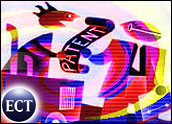
Microsoft and Sun Microsystems say that eight months into their 10-year cooperative alliance, dividends are already being paid in the form of increased interoperability of their products.
The companies, which reached a groundbreaking deal in March that settled years-old lawsuits and brought the two bitter enemies together, said they are actively working on developing Web services standards and finding ways to make Windows software run better on Sun hardware and other goals.
The two companies say they’ve had dozens of meetings since the agreement, which included US$2 billion worth of royalty payments to Sun to end lingering legal action.
Managers from the two companies meet weekly to update progress, and executives from the two companies have met about 15 times, the companies said. Sun and Microsoft executives also have met together with common customers.
Though they had little solid progress to report, representatives of both companies said in a conference call that they have already started to find common ground.
“We really are working toward a world where both Sun and Microsoft products coexist,” Greg Papadopoulos, Sun’s chief technology officer, said. “We’re going to ensure unique levels of interoperability between them.”
‘More Similar than Different’
Papadopoulos said the early interaction has shown that the two companies are actually “more similar than different” in how they approach research and development of products and how they view intellectual property.
“We’re actually quite pleased with the progress the companies have made so far in the early stages of this relationship,” said Hank Vigil, corporate vice president for consumer strategy and partnerships at Microsoft.
However, the two sides still don’t see eye-to-eye on all issues, most notable among them being the federated identity approach within Web services, a technique that would allow a single sign-on or identity to give access to multiple networks.
Sun was a founder of the Liberty Alliance, while Microsoft backs WS-Federation, a spec it helped write. The companies said they would seek some common ground that would enable customers to log onto both Windows servers and those running Sun’s Solaris, at the same time.
On Same Page
The two are on the same page in other Web services areas, with engineers from both firms having served as authors of some of the already adopted specifications, such as WS-Management and WS-Addressing.
“The change at this point is that we’ve found it a lot easier to figure out what standards we should be working together on and designing in a way that works well for both of us,” said Andrew Layman, director of distributed systems/interoperability at Microsoft.
The two companies have also set up a test center to work on interoperability issues at Microsoft’s Redmond, Washington, campus.
The update might have been a way of assuring common customers that advances based on the alliance are on the way.
Or it might have been simply to remind the technology world that the two buried the hatchet, analysts say. Some of the analysts have expressed skepticism that the long-term deal struck between the two was little more than a way to cover the fact that Microsoft was making a huge payout and that Sun was willing to walk away from its claims of patent infringement.
Willing Audience
“I don’t believe customers are out there holding their breath to see what comes out of this,” Gartner analyst Martin Reynolds said. “But on the other hand, it does bear watching if you’re considering new investments in hardware and software.”
Most enterprises and other large customers would hail a true partnership between their hardware and software vendors, he added, but few expect a single alliance to change the landscape in a short time.
“They’ve got a willing audience,” he added. “Everybody wants things to work together better than they do now.”





















































